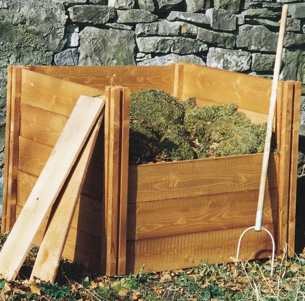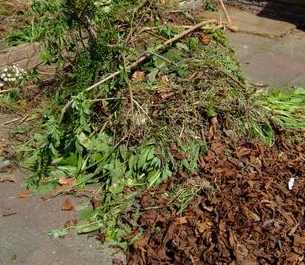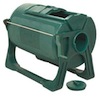Composting 101: The Nitty Gritty Page 2
Carbon and Nitrogen: A Healthy Balance
All organic matter you add to your compost contains carbon and nitrogen. Most decomposers thrive on a diet that contains 30 times more carbon than nitrogen (a 30:1 ratio). The closer you get to that ratio in your compost pile, the faster the composting process will be. Too much carbon slows things down, and too much nitrogen can lead to odor problems.
An easy way to balance the ratios is to use 3 parts carbon materials (brown stuff like leaves) to 1 part nitrogen materials (green stuff like grass clippings). Composting will happen at other ratios, and experience will help you dial in the right amounts of materials to use.
Chop Chop Chop
For most of the material you put in your compost pile, as a general rule the smaller the pieces, the faster the rate of decomposition. Plant material is easier for microbes to break down due to the cuts and wounds caused by chopping and shredding. More surface area in small pieces allows for easier chemical and physical decomposition, and uniform materials are easier to turn and moisten. Your goal should be to keep organic matter in 2 inch long bits and pieces.
Moisture and Air
The organisms hard at work in your compost pile need moisture to survive. The ideal moisture level is 40 to 60 percent water by weight. Squeezing a handful of materials from different parts of the pile will determine the moisture level. Everything should be damp like a wrung-out sponge; if it's not, it's time to add moisture.
Too much moisture is as bad as not enough; Too much water will block air flow and can result in odors. If you can squeeze a drop or two of water out of a handful of ingredients, things are too wet.
Turning the material in your compost pile will introduce more air and help dry out wet matter. You can also add moisture at the time of turning if the pile is too dry. A properly aerated compost pile has no bad odors. Bad odors usually indicate too much moisture. Adding dry carbon materials like leaves, straw, or sawdust will soak up excess moisture.
Turn Up the Heat
The hard-working organisms in your compost pile will generate heat as a by-product of their food bingeing, reproducing, and dying. Managing this heat will help you produce compost quickly.
Mesophilic critters thrive in your compost pile between 40 to 104 degrees Fahrenheit. These bacteria will break down the easy-to-decompose materials, then die off as the temperature rises as a result of their actions.
Thermophilic organisms will take over the process from 105 to 140 degrees. These heat-resistant microorganisms will work on material that's harder to break down, such as complex carbohydrates.
Managing the heat in your compost pile by taking its temperature with a compost thermometer daily will help you make compost faster. Everything breaks down in cooler temperatures, but higher temperatures result in much quicker decomposition. As the supply of food, air and water is used up, the temperature in your compost pile will drop. Turning or aerating the pile, mixing newer material into the center, and adding moisture will help temperatures rise. Heating your pile to between 130 and 140 degrees for 72 hours will destroy most plant pathogens and weed seeds.
Don't Overdo It
Too much heat can be a bad thing, so monitoring your compost pile's temperature is important. Temperatures over 170 degrees Fahrenheit will shut the process down, because the high heat will inhibit the microbe's activity. Turning the pile to aerate the pile's core will release any heat build-up.
It's important to reiterate: Don't worry if things are too hot or too cold! These natural processes are going to happen no matter what. With time and experience, you'll soon have your compost pile turned into a clean, efficient compost-making machine.
Making Home Composting Quicker and More Convenient
There are products available for home composters that are designed to make the compost process even quicker and easier than it already is. Read more about these helpful products HERE.
Composting in the City
Composting isn't just for rural or suburban folk with lots of space! If you live in an urban area with limited (or no) space, you can still compost! It's true! Learn more about City Composting HERE.Interested In More On Composting?
We offer a lot of information on composting and some great composting product reviews. If you really want to get your feet wet in the composting business, be sure to read these additional articles of interest:
Composting 101
Worm Composting
Vermiculture - A Worms Healthy Home
Vermicomposting - Troubleshooting Tips
Compost Pit
Compost Container
Making Compost
Home Compost Products
Soil Saver Classic Composter Product Review
GeoBin Composting Container Product Review
Worm Factory 360 Product Review






































































